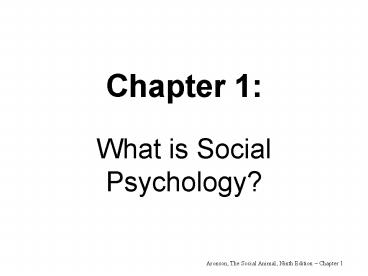Chapter 1: What is Social Psychology PowerPoint PPT Presentation
Title: Chapter 1: What is Social Psychology
1
Chapter 1What is Social Psychology?
2
Roots of social influence
- As far as we know, Aristotle was the first to
formulate principles of social influence
3
Definition of social psychology
- The influence that people have upon the beliefs
and behavior of others
4
Concerns of social psychology
- How are people influenced?
- Why do people accept influence?
- What variables increase and decrease the
effectiveness of social influence? - Is the effect permanent or transitory?
- Do the same principles apply to everyone?
5
Amateur psychologists
- All human beings interact with other human beings
- Human beings naturally develop hypotheses about
social behavior - We test these hypotheses to our own satisfaction
6
Hindsight bias
- This is the tendency to overestimate our ability
to predict events, once we know the outcome - Everyone is susceptible to this bias
7
Professional psychologists
- Scientific research applies more rigor and
impartiality to tests of hypotheses - Research often demonstrates things we already
know to be true - However, when carefully investigated, some things
we know turn out not to be true
8
Controlled experimentation
- Professional psychologists have a big advantage
- They can conduct experiments which control events
- And draw conclusions based on precise data
9
Situational effects
- Social psychologists study social situations that
affect human behavior - Sometimes these situations elicit behavior that
appears abnormal - We conclude that the abnormal behavior is a
result of situational pressures, not a deviant
personality
10
Susceptibility
- We tend to underestimate our own susceptibility
to situational factors - This impacts on our thinking about social
problems, such as racism
11
Situational variables are key
- In order to have a functional approach to social
problems, it is of paramount importance to
understand the impact of situational variables
that produce destructive behavior
PowerShow.com is a leading presentation sharing website. It has millions of presentations already uploaded and available with 1,000s more being uploaded by its users every day. Whatever your area of interest, here you’ll be able to find and view presentations you’ll love and possibly download. And, best of all, it is completely free and easy to use.
You might even have a presentation you’d like to share with others. If so, just upload it to PowerShow.com. We’ll convert it to an HTML5 slideshow that includes all the media types you’ve already added: audio, video, music, pictures, animations and transition effects. Then you can share it with your target audience as well as PowerShow.com’s millions of monthly visitors. And, again, it’s all free.
About the Developers
PowerShow.com is brought to you by CrystalGraphics, the award-winning developer and market-leading publisher of rich-media enhancement products for presentations. Our product offerings include millions of PowerPoint templates, diagrams, animated 3D characters and more.

